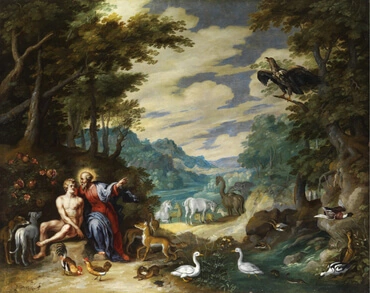1
Und die Schlange war listiger als alles Getier des Feldes, das Jehova Gott gemacht hatte; und sie sprach zu dem Weibe: Hat Gott wirklich gesagt: Ihr sollt nicht essen von jedem Baume des Gartens?
2
Und das Weib sprach zu der Schlange: Von der Frucht der Bäume des Gartens essen wir;
3
aber von der Frucht des Baumes, der in der Mitte des Gartens ist, hat Gott gesagt, davon sollt ihr nicht essen und sie nicht anrühren, auf daß ihr nicht sterbet.
4
Und die Schlange sprach zu dem Weibe: Mit nichten werdet ihr sterben!
5
Sondern Gott weiß, daß, welches Tages ihr davon esset, eure Augen aufgetan werden und ihr sein werdet wie Gott, erkennend Gutes und Böses.
6
Und das Weib sah, daß der Baum gut zur Speise und daß er eine Lust für die Augen und daß der Baum begehrenswert wäre, um Einsicht zu geben; und sie nahm von seiner Frucht und aß, und sie gab auch ihrem Manne mit ihr, und er aß.
7
Da wurden ihrer beider Augen aufgetan, und sie erkannten, daß sie nackt waren; und sie hefteten Feigenblätter zusammen und machten sich Schürzen.
8
Und sie hörten die Stimme Jehovas Gottes, der im Garten wandelte bei der Kühle des Tages. Und der Mensch und sein Weib versteckten sich vor dem Angesicht Jehovas Gottes mitten unter die Bäume des Gartens.
9
Und Jehova Gott rief den Menschen und sprach zu ihm: Wo bist du?
10
Und er sprach: Ich hörte deine Stimme im Garten, und ich fürchtete mich, denn ich bin nackt, und ich versteckte mich.
11
Und er sprach: Wer hat dir kundgetan, daß du nackt bist? Hast du gegessen von dem Baume, von dem ich dir geboten habe, nicht davon zu essen?
12
Und der Mensch sprach: Das Weib, das du mir beigegeben hast, sie gab mir von dem Baume, und ich aß.
13
Und Jehova Gott sprach zu dem Weibe: Was hast du da getan! Und das Weib sprach: Die Schlange betrog mich, und ich aß.
14
Und Jehova Gott sprach zu der Schlange: Weil du dieses getan hast, sollst du verflucht sein vor allem Vieh und vor allem Getier des Feldes! Auf deinem Bauche sollst du kriechen und Staub fressen alle Tage deines Lebens.
15
Und ich werde Feindschaft setzen zwischen dir und dem Weibe und zwischen deinem Samen und ihrem Samen; er wird dir den Kopf zermalmen, und du, du wirst ihm die Ferse zermalmen.
16
Zu dem Weibe sprach er: Ich werde sehr mehren die Mühsal deiner Schwangerschaft, mit Schmerzen sollst du Kinder gebären; und nach deinem Manne wird dein Verlangen sein, er aber wird über dich herrschen.
17
Und zu Adam sprach er: Weil du auf die Stimme deines Weibes gehört und gegessen hast von dem Baume, von dem ich dir geboten und gesprochen habe: Du sollst nicht davon essen, so sei der Erdboden verflucht um deinetwillen: mit Mühsal sollst du davon essen alle Tage deines Lebens;
18
und Dornen und Disteln wird er dir sprossen lassen, und du wirst das Kraut des Feldes essen.
19
Im Schweiße deines Angesichts wirst du dein Brot essen, bis du zurückkehrst zur Erde, denn von ihr bist du genommen. Denn Staub bist du, und zum Staube wirst du zurückkehren!
20
Und der Mensch gab seinem Weibe den Namen Eva, denn sie war die Mutter aller Lebendigen.
21
Und Jehova Gott machte Adam und seinem Weibe Röcke von Fell und bekleidete sie.
22
Und Jehova Gott sprach: Siehe, der Mensch ist geworden wie unser einer, zu erkennen Gutes und Böses; und nun, daß er seine Hand nicht ausstrecke und nehme auch von dem Baume des Lebens und esse und lebe ewiglich!
23
Und Jehova Gott schickte ihn aus dem Garten Eden hinaus, um den Erdboden zu bebauen, davon er genommen war;
24
und er trieb den Menschen aus und ließ lagern gegen Osten vom Garten Eden die Cherubim und die Flamme des kreisenden Schwertes, um den Weg zum Baume des Lebens zu bewahren.







